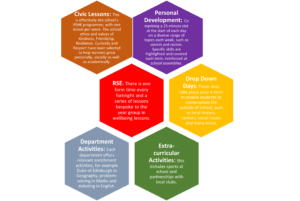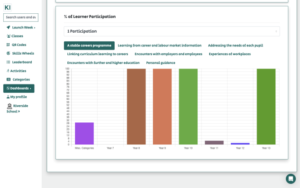Introduction
The purpose of this article is to act as a case study to illustrate how schools, in practice, can manage the personal development of their pupils using a skills or character framework, incorporating the school ethos, and how they can build in sufficient time to do this within an already crowded curriculum.
The case study is Hornchurch High School, who have developed an innovative and exemplary approach to enhance the capture and management of learners’ skill development relating to wider school life; through extracurricular activities, emphasising the school’s commitment to holistic student development and supporting the school’s broader goal of nurturing well-rounded individuals.
Hornchurch High initially wanted a tool to help them with their objective of recording students’ participation in activities. However, over time, they have adapted their approach to discover a great way to use the Kloodle digital platform for other functions, which they hadn’t originally anticipated, such as facilitating the tracking of skills’ development as well as participation, inclusivity, and early interventions; all this is done through the seamless integration of technology to promote a vibrant and engaging school environment beyond the academics.
Activities And Enrichment Beyond Exams
Hornchurch High believes that the skills and qualities instilled in young people will have a profound impact on their lives and future opportunities. Therefore, the broad and balanced curriculum is bolstered by a wide range of enrichment and extra-curricular opportunities, which support the students in tailoring their learning to their skills, interests and preferences and are designed so that the pupils can develop their personal and social strengths. This scenario is perfect for the use of Kloodle.
In order to achieve this student-centred approach, there is a range of extra-curricular and enrichment activities on offer in the timetable to promote personal development. These include:

This range of activities is specific to Hornchurch High; other schools may indulge in a different approach. Extra-curricular activities don’t have to be just those arranged internally, some schools participate in external activities, such as interacting with youth organisations or clubs.
The school leaders at Hornchurch High are focussed on inclusivity, ensuring that pupils from all backgrounds and abilities take up these enrichment opportunities and are keen to demonstrate and monitor participation. The school collects the data on all activities to showcase the enrichment the students have participated in during the term to the school’s Senior Leadership Team and parents. Kloodle provides an easy channel to collect the data in this way.
Reasons Why Schools Use Kloodle to Log Extra-curricular Activities
There are two main reasons why the school uses Kloodle to log extracurricular activities:
- Firstly, it helps the children develop life and character skills at school; their progress can also be shared with senior leaders, teachers, mentors and parents.
- Secondly, the teacher can make early interventions, which we’ll look at in more detail below.
Schools Can Set Up When They Want, Not Just at the Start of the Year
Hornchurch High decided to adopt Kloodle at the end of the second term. You might think that could have proved problematic – what about the first term’s activities?
Well, within a couple of minutes, a teacher was able to upload onto Kloodle the data about activities that the students had previously carried out during the year from a CSV file. Kloodle then instantaneously allocated the activities and skill development to every student’s profile retrospectively. Effectively, therefore, the school utilised a full year of data even though they didn’t start using Kloodle at the beginning of the school year in September.
Here is a link to the 5 Step Process about how to get up and running on Kloodle: https://bitly.ws/3dcwq
Set Up Week After The Initial Induction
After the initial induction on Kloodle, at the beginning of each term the school holds a set up week, in which they ‘onboard’ the students onto Kloodle. This involves explaining how Kloodle works and what is expected of them. Onboarding means that a student is allocated a personal profile in their name on Kloodle, which only they can access and then use Kloodle to showcase their skills’ development over time. Initially, the school set the system up just for years 7 and 8, so the teachers could get used to the system and management in bite-sized chunks. The intention was then to extend this to year 11 over the next few terms.
During this week, year groups in their forms are onboarded in class, typically during form time. Staff upload activities, typically from a CSV file, for the students to do that term and the students can start to ‘try out’ Kloodle by carrying out some activities from the ‘activity library’, capturing and tagging the skills, and making reflections. Usually, students pick this up very quickly.
This video shows how staff can add activities |
https://vimeo.com/899966140/c3ee2ad95b |
How students can capture activities and post reflections |
https://vimeo.com/899968323/c02e84c146 |
In a recent presentation made to staff and students, it was really interesting to see how the children cotton on very quickly to what to do and how to complete their Kloodle profile. We’ve designed the system over a decade with lots of feedback and input from a diverse range of schools and learners with the goal of making it very intuitive. This is important so that students get off to a good start and build confidence.
Students Can Update Their Profile At Home As Well
Students can also log activities that they perform at home. So, for example, in a recent session, one Hornchurch student talked about how he could build his employability skills by working in his dad’s workshop and post that on his Kloodle profile. Bang on!
Frequency of Activity on Kloodle is A Critical Factor for Success
One key factor for successful adoption is that students need to use the platform and update their profile on a regular basis. This maintains momentum and interest and helps students realise that developing their skills is a continuous process which happens all the time in every lesson, not just once at the end of term, like an exam. Obviously, this has to be balanced against the myriad of other things which need to be squeezed into the curriculum.
Hornchurch has achieved an optimal balance:
- Every week in ‘Civics’ lessons (some schools may refer to this as ‘PSHE’) form-teachers take activities from a pre-created list on Kloodle or create their own activities to add to Kloodle. The teachers then allocate activities which have already been performed to the relevant individual students and/or groups of students in order to log participation. That logging and allocation in Kloodle automatically updates the profiles, saving a lot of time and grunt-work.
- Once every three weeks, students add their own personal reflections relating to the activities they have undertaken. The reflections can include photos, videos and blogs and so it creates a richness around the personality and character of each individual. As the number of reflections increases, students improve their confidence and post more meaningful and better-developed journals, thus increasing the value of their profile.
Having Staff Dedicated to Skill Development is a Critical Factor for Success
A school’s staff body needs to believe in the value and positive impact of skill development on learners from performing extra-curricular activities. Hornchurch initially started with one teacher responsible for skills’ development, but then that increased to 30 teachers in the next year and now all staff are on Kloodle.
Student Participation in Activities
Kloodle has a functionality feature which enables teachers to identify quickly and effectively all sub-groups of learners, such as pupil premium or ethnic background, and maps them to the activities performed. The data also empowers the school to decide whether a particular activity attracts sufficient participation, and, if not, it can be replaced, keeping the suite fresh and appealing to students.

Early Warning System for Intervention
Through Kloodle, Hornchurch School can track learners’ progress almost in real-time and, at any stage, teachers can intervene swiftly and easily when they spot that a specific group of learners either need more support, or extra provision. It is possible to see when activities haven’t been done and so the teacher can send messages to a group or an individual asking them to tag in activities, so they don’t get behind. The school management can generate reports from the data on Kloodle, which aids identification of interventions and where future support is required.
These interventions help the school to achieve their objective which is for ‘every single student to participate in six or more enrichment activities which specifically develop their skills and character’.
This student-centric intervention process enables school leaders to ensure that pupils from all backgrounds and of all abilities take up these enrichment opportunities.
The Convenience of Having All the Data in One Place
By uploading the information to Kloodle, the school is provided with all the necessary data on progression over time. Also, all the enrichment data is in one place and can be integrated with different systems and spreadsheets for the numerous activities if necessary.

Compliance With Ofsted Requirements
The school is very keen to promote extracurricular activities, primarily, as they believe this really helps children to develop. However, it is satisfying that management can download reports from Kloodle, which help them to comply with Ofsted requirements. A double tick.
Building the Group Skills’ Wheel
Pupils complete an activity as a class, in different groups or individually. The head of years will be responsible for managing attendance data for a year group, the form-tutor for form groups, senior leaders for the whole school. Individuals must log their own activities.
Individual students can ‘grab’ an activity from the activity library and teachers have the facility to add individual students to an activity if required. Then the skills relating to that exercise can be tagged and captured on Kloodle and individuals’ skills’ wheels are updated to reflect the growth in skills from the activity. However, as well as this, a skills’ wheel for a whole group, class or club of pupils can be presented, which can illustrate the growth in skill development for the specific collection of students.

Measuring the impact
Over time, Hornchurch High wants to measure the impact that the events in which the children participate have on developing their character and skills. Senior management wants to establish how many and who exactly are getting involved in wider school life. They believe that the greater participation in wider school activities and experiences then the greater the development and understanding of character and skills there will be with their learners. They want to utilise the wide range of provisions on offer.
Kloodle enables tracking in real time and regular monitoring of progress allows the school to discuss, reward and intervene, where necessary, with groups or individuals who are at different stages of this process. Further activities based on the needs of different types of learners can be suggested, offered or devised.
This is beneficial for the teachers as well as the learners. Until now schools were only able to measure the impact of the curriculum and effectiveness of their teaching though exams. Now they can accurately measure the impact that all activities and experiences are having on learners’ development, both personal and academic. This is as equally rewarding for staff as it is for learners.
In Summary, The Benefits of Using Kloodle for Skill and Character Development
This case study demonstrates how Kloodle can facilitate skills’ tracking, character development, student participation, inclusivity, and early interventions through the seamless integration of technology to promote a vibrant and engaging school environment beyond academics.
In summary, before Hornchurch High started using Kloodle they had no way of measuring the impact that their enrichment was having on outcomes. Now, the school can log the extracurricular activities, which foster students’ skill development, and the Kloodle platform serves as a comprehensive tool that, not only records activities efficiently, but also, allows students to showcase their skills’ progression over time. The visual representation of skills on the Kloodle wheel offers a unique and dynamic way for students to take ownership of their own skills and character development. Moreover, Kloodle’s user-friendly interface facilitates quick onboarding of students, encouraging them to actively participate in capturing and reflecting on their experiences.
The platform’s functionality goes beyond data collection; it becomes an early warning system for interventions, enabling teachers to support students promptly. By centralising all data related to enrichment activities, Kloodle provides the school with a convenient and holistic overview, aiding compliance with Ofsted requirements and allowing for more informed decision-making regarding the effectiveness of various programmes.
In summary, Hornchurch High uses Kloodle to optimum effect; that is, the easiest, quickest and most effective way of obtaining value out of Kloodle with minimum time carved out of the curriculum. That’s why we want to share this case study with you.

